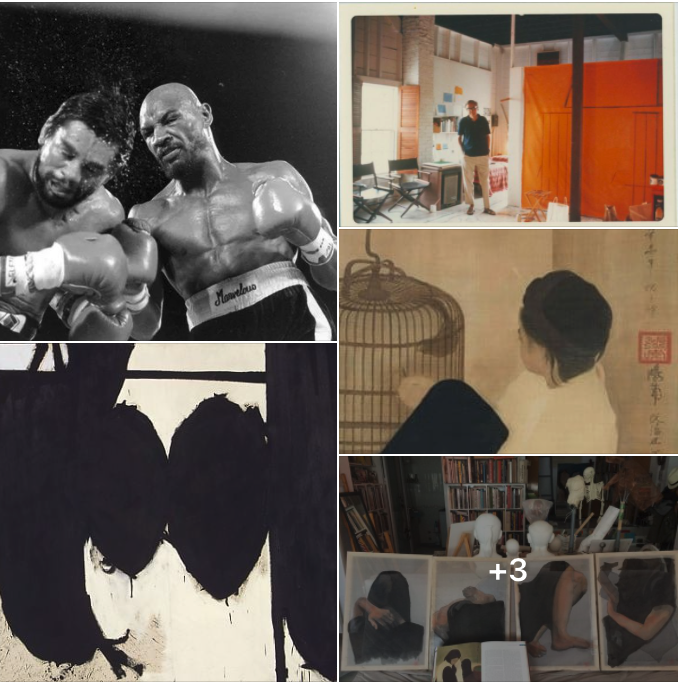Lives of Others, Both Close and Distant:
Marvin Hagler, Robert Motherwell and Nguyen Phan Chanh
Over the last days, I’ve been thinking about connections, however trivial and personal or fictional they may be. Yesterday, I finished a Showtime four-part series on the four kings of boxing (Sugar Ray Leonard, Roberto Duran, Thomas Hearns and Marvin Hagler) who reigned during a very special time in boxing between the eras of Muhammed Ali and Mike Tyson. Of these greats, Marvin Hagler was my favorite, a working-class boxer from Massachusetts. I remember pretending to be Marvelous Marvin as a child, play boxing with my friends. He trained in Provincetown on Cape Cod and was somewhat of a local legend. One of my uncles was a cop with the Provincetown PD and was sometimes placed on the guard detail for Hagler. He told me that he once dared Hagler to knock him out, which he claims, Hagler willingly obliged.
I remember going to Provincetown many times as a child in the 70s and 80s, when it still seemed like the Old Cape Cod, with roller skate delivery A&W’s and drive-in theaters with those clunky metal speakers that attached car windows. Bulkheads, gray shingles, neighborhood ice cream trucks the summer and connected mittens and snowsuits in the winter. It was also during these years, unknown to me, that Robert Motherwell painted in his home studio on 631 Commercial Street in Provincetown. Of all the abstract expressionists, I admire Motherwell the most. It was in this small Cape Cod studio that he painted one of his most renowned works, Elegy to the Spanish Republic No. 70, now at the Metropolitan Museum. I saw this work in person several years ago at the Met and I was immediately transfixed by the power of black. When I recently returned to Massachusetts to do my residency at the Worcester Art Museum in 2019 researching the works of Edward Hopper, John Singer Sargent and Winslow Homer, I realize now that I should have added Motherwell to that list. I was in Provincetown painting watercolors, likely minutes from Motherwell’s studio unaware. Motherwell remained on Cape Cod until 1991 where he died and is still buried. I graduated High School in 1990. It is likely every summer of my early life on Cape Cod was spent with Motherwell painting in Provincetown. My family are what we consider locals, working class people who live year-round on Cape Cod. Motherwell would have been considered the “summer people”, those that vacationed on the Cape. In Motherwell’s own words, “Summer people are never wholly accepted by natives, but that does not prevent us from absorbing the light and the sea air as deeply as any, almost into one’s blood, certainly into one’s eye and mind and painting wrist.” I always considered Motherwell a New Yorker, but in my current thinking, I now think he was as much as a local.
The expanses of black that Motherwell painted are also the same things that attracted me to Vietnamese modernist painter Nguyen Phan Chanh. I just finished an interview this morning with Art & Market (Singapore) on a series where a contemporary artist responds to one modern Southeast Asian one. In 2017, I created and exhibited a series of new works responding to the Vietnamese modernist masterworks on display at the de Sarthe Gallery in Hong Kong. I took immediately to Chanh’s silk paintings and responded with a series of four silk paintings, Configurations in Black (After Nguyen Phan Chanh). While his work was my initial attraction, after researching his history, I found that his life also had parallels with mine. Among the first intake of students at the newly established Ecole Superior des Beaux Arts Indochine, established in 1925 in Hanoi, then still a colonial territory of France, he entered the school at 33, much older than the other students. His style was from observation rather than imagination, in particular depicting women and children as they were in real life – working in markets, playing games. While I would consider his depictions realist in that respect, he often painted large areas of solid black that would seem like massive black abstractions from afar. He was also working class and a soldier.
It was also on Cape Cod that I found a box of photographs that another Uncle had taken during his time in Vietnam as a US Army soldier in the sixties, many in black and white. It is from this private collection that I will begin my next series of paintings for exhibition at the end of the year – marking only the second autobiographical work in the last twenty years.
Speaking of Chanh this morning, recalling Motherwell and watching Hagler on the documentary, in my own private universe, they all came together into one seamless narrative – running through blackness, Provincetown and Vietnam.
---
Motherwell in Provincetown
Rest In Peace, Marvelous Marvin Hagler (1954-2021)
Nguyen Phan Chanh’s Career & Silk Paintings
631 Commercial Street



